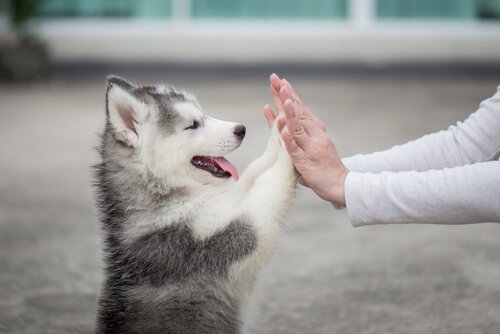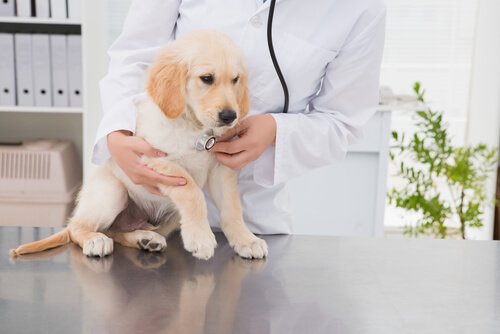A Puppy's First Days at Home

A puppy’s first days at home can be a huge change. All of a sudden you have this little needy animal that’s still a baby. So make this time easy for yourself by being prepared beforehand.
Preparing for Your Puppy’s Arrival
Make sure you have everything ready before your puppy arrives at your home. The entire family needs to agree on who’s going to be assigned certain duties. For example, cleaning, giving them food and water, taking them to the vet, and going on walks once they can go outside.
You also need to find a place for the puppy to have for himself. This place should be one where they can sleep, go to the bathroom, and eat. Even though your puppy is still really young, it’s a good time for them to start getting used to a routine, especially one that’s more convenient for you.
In addition, also need to make sure your house is pet-proof by making sure anything your puppy might run into or chew on is out of the way. Close off dangerous areas by using a fence before they arrive at the house, that way they will adapt much faster to their surroundings and prevent any accidents and frustration.

Once the puppy gets older you can put things back where they belong and establish new rules. Just remember that a puppy’s first days at home is a big change for everyone, and it’s always better to be safe than sorry.
Make a Health Plan
Even though you have a healthy puppy, it’s still important to be prepared for the worse. A health plan starts with picking out the right vet for your puppy. Find another one that’s always on call and get his/her number, just in case something bad ever happens.
Talk to your vet about a vaccination schedule and record for your puppy prior to or on your puppy’s arrival. Ask the bet about your dog’s breed or mix to see if it may develop any kind of genetic illnesses.
When your puppy arrives, take them to the vet for their first check-up, to start a medical record and get them dewormed. If your puppy gets sick or needs a checkup, you’ll already know your vet and trust him/her. If you feel like you made the wrong choice, then you’ll have given yourself time to choose a better one.

Development and Socialization
When puppies arrive at their new home, they’re normally between 7-9 weeks old. They’re in what’s known as the socialization phase. This is a developmental period where they’re full of curiosity and fearlessly investigate everything new to them.
However, socialization isn’t something you should rush through. Your puppy wants to learn new things, but it might start to feel overwhelmed. When you want to show them new things, always remember:
- New stimuli should come bit by bit, and never all at once. For example, loud music: start with a calm song at a low volume and go from there.
- Give your dog the option to leave if it doesn’t like what’s happening.
- Don’t rush to show them new things: be patient and let them go at their own pace.

The socialization phase is a perfect time for a puppy to meet people and animals. Introduce your puppy to senior citizens, children, people with beards, tall people, cats, rabbits, hamsters, and turtles. Anything new a puppy learns before the age of three months will become a habit for their entire life.
If you can’t take advantage of this phase for some reason, don’t worry. Your puppy will still be able to learn new things throughout their life. All you need is a little more patience.
A Puppy’s First Days at Home: don’t be strict
Most people are usually too strict with dogs, even when they’re puppies. During a puppy’s first days at home, owners focus too much on commands and discipline and forget about other important things.
The rules can always change. If it behaves badly or makes a mistake you can always leave them for later. When a dog is so young, it’s more important for them to feel loved and safe than making sure they don’t jump on the couch. Orders are something you can postpone later on in life.

For example, puppies will learn how to be by themselves later on in life. It’s okay for them to sleep in your room for a while in order for them to feel safe and sleep better. Also, puppies can be housebroken and learn not to jump onto the couch when they’re older.
During your puppy’s first days at home, it’s easy to get carried away with disciplining them. However, that can make you forget about the truly important things: safety, health, and avoiding accidents. Before you start establishing rules and giving commands, take a second and enjoy being with your puppy while it’s at this sweet, tender age.
This text is provided for informational purposes only and does not replace consultation with a professional. If in doubt, consult your specialist.